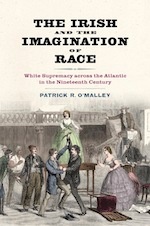Today, we are happy to bring you our conversation with Patrick R. O’Malley, author of The Irish and the Imagination of Race: White Supremacy across the Atlantic in the Nineteenth Century
What inspired you to write this book?
For several years, my scholarship has been inspired by postcolonial Irish studies, and I knew I wanted to write about Irish nationalists in the United States in the years leading up to the American Civil War. One issue that I wanted to address was that in some postcolonial Irish work there’s been what I think is a misleading conflation between the forms of discrimination and hardship experienced by the nineteenth-century Irish—in both the United Kingdom and the United States—and the racist violence enacted against Black people, both during and after the legal institution of American slavery. It seemed important to me to disentangle those, to insist upon the specificity of Black suffering and Black resilience, and show that even if nineteenth-century Irish writers claimed that they were being treated in the same way that enslaved Black people were we need to understand the differences.
What did you learn and what are you hoping readers will learn from your book?
The Afropessimist scholar and writer Frank B. Wilderson III has a really important term: “the ruse of analogy.” It’s certainly true that the nineteenth-century Irish and Irish Americans suffered extreme hardships and forms of discrimination, and that the activism of nineteenth-century Irish nationalists was both brave and necessary—that is fundamental to this book—but we shouldn’t appropriate the history of African American enslavement and racial violence to describe Irish experience; we can and should study it on its own terms. When Frederick Douglass was in Ireland in 1845, he was repeatedly approached by Irish people who told him that they also were enslaved by the brutalities of British colonial rule. He had an answer for them: “The error which people who spoke in the way he had stated fell into was, that they did not sufficiently distinguish between certain forms of oppression and slavery. Slavery was not what took away any one right or property in man; it took man himself, and made him the property of his fellow….Had they anything like this in Ireland? Ah, no!” Even in 1845, Douglass has identified the “ruse of analogy.”
What surprised you the most in the process of writing your book?
I knew that many Irish nationalist writers were aware of conversations about race in the United States, sometimes in order to rhetorically (and occasionally duplicitously) to advance Irish rights in the United Kingdom. What I hadn’t realized was how many Black intellectuals and writers were also paying close attention to the Irish situation. Both Frederick Douglass and Harriet Jacobs knew that the Irish nationalist convicted felon John Mitchel had arrived in the United States—and both condemned his quick affiliation with the most virulently racist theorists of the American racial state and, later, the Confederacy. They were noticing which aspects of the Irish condition translated—and which didn’t.
What’s your favorite anecdote from your book?
I’m not sure I would call it a favorite anecdote, but it’s a telling one: I’m fascinated by the fact that Oscar Wilde, during his 1882 lecture tour of the United States and Canada, visited the aging Jefferson Davis in Mississippi. Wilde was apparently reading Davis’s Rise and Fall of the Confederate Government during his travels and expressed a desire to meet Davis. After the visit, Wilde was quoted by a newspaper saying, “The case of the South in the civil war was to my mind much like that of Ireland today.” It’s a rather different representation of the relationship between Irish anticolonial activism and the American racial state than we often imagine.
What’s next?
I’m starting a new project on the ways that late Victorian women theorized and debated sexual consent and how to dismantle the sexual double standard. I expect that I’ll learn many things that challenge my preconceptions on that topic as well.





